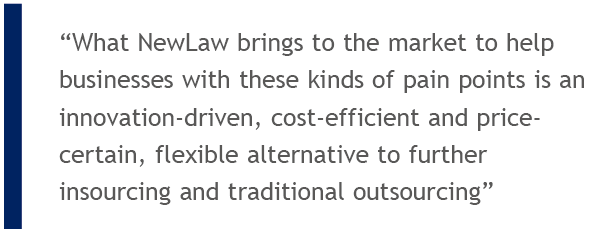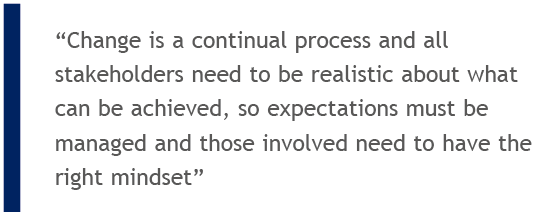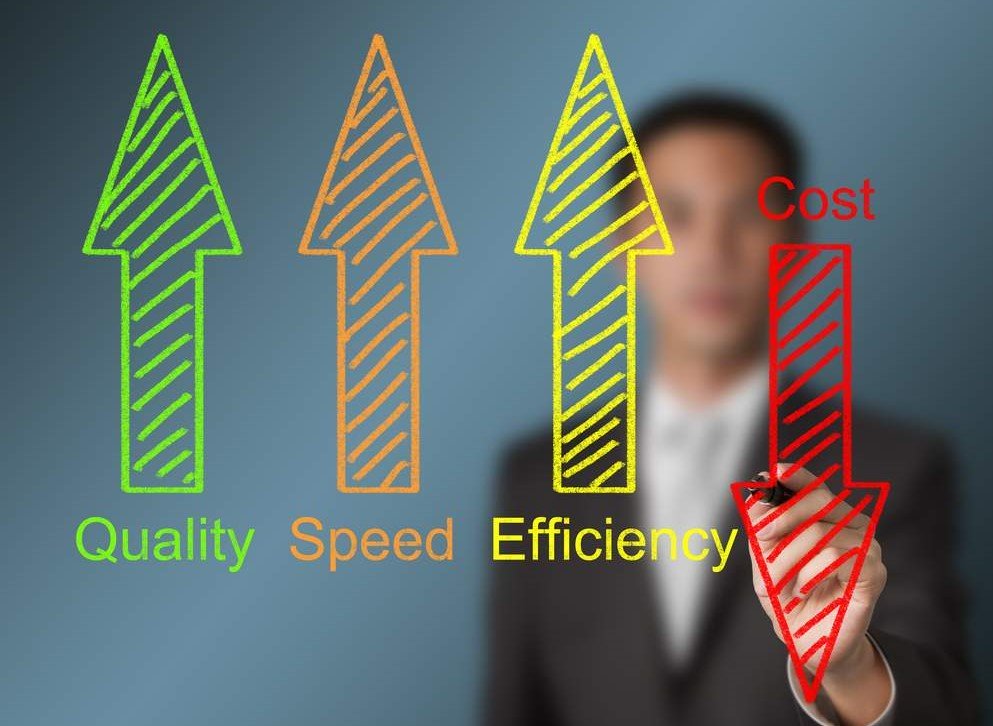Published in Asian-mena Counsel: Legal Innovation & Technology Special Report 2019
 Rob Shakespeare of KorumLegal discusses the market for flexible and innovative legal solutions in one of the world’s fastest-growing regions.
Rob Shakespeare of KorumLegal discusses the market for flexible and innovative legal solutions in one of the world’s fastest-growing regions.
 What’s driving the demand for NewLaw in Southeast Asia?
What’s driving the demand for NewLaw in Southeast Asia?
Most legal teams face cost and resourcing constraints and their response in recent history has tended towards bringing more work in-house. However, despite this growth in numbers of corporate legal teams, their lawyers are more stretched than ever, inundated with the demands of an increasingly regulation-heavy environment and fighting to keep up with the pace of business which, powered by technology, is accelerating dramatically. A business delivering instant fulfilment to its customers needs the same from its legal department; a huge challenge which most corporate teams will need to innovate to solve.
Southeast Asia itself also presents a few characteristics that showcase how NewLaw adds value. The region encompasses numerous legally and culturally diverse jurisdictions where local market knowledge is vital. Many of the world’s fastest growing tech businesses are here, with business models that can scale quickly across borders, so their legal teams are challenged to manage legal and regulatory hurdles without being an anchor on expansion. Such obstacles point to solutions comprising multi-jurisdictional legal expertise allied with project management and technology skills, which can be scaled up and down across jurisdictions at a moment’s notice, often for short term projects.
What NewLaw brings to the market to help businesses with these kinds of pain points is an innovation-driven, cost-efficient and price-certain, flexible alternative to further insourcing and traditional outsourcing. It can maximise efficiencies by harnessing process and technology expertise to legal and cultural know-how and is able to deliver support tailored to the client’s time and budgetary constraints. Simply put, it delivers legal solutions in a different way and is a market response to limitations of the more traditional service providers.
In-house legal departments are under constant pressure to ‘do more with less’. How do NewLaw legal solutions help their clients achieve more?
Legal teams are not revenue generating so their contribution to business profitability is principally through increased efficiency. However, on a daily basis we see how enhancements in our client’s legal operations can improve collaboration and contribute to revenue generation. Take an IT outsourcing business, for example, and think about the length of time it might take to negotiate and execute a high-value, complex customer contract. By shortening this process, and speeding up revenue recognition, a legal team can have a measurable and significant impact on enterprise value.
With its focus on helping legal teams to identify and add value by combining people, process and technology, NewLaw can help deliver these kinds of innovative and transformational changes to the legal operations. The suite of solutions obviously varies but NewLaw companies such as KorumLegal, can provide flexible people solutions through to tailor made process and technology consulting for key work streams. The solutions often work well as a “managed legal service” where it will end-to-end project manage the repeatable, sometimes lower value work freeing the in-house team to focus on higher value-add work streams and strategic projects.
What are the most important questions an in-house legal team should ask before talking to a NewLaw solutions provider?
Many NewLaw providers can offer a range of solutions, from the relatively straightforward resourcing support through to full-blown digital transformation. Our recommendation therefore is always to start by clearly identifying the pain point(s) and, to the extent known, the end goal or intended operating model. There should also be an agreed definition of what constitutes ‘value’ from both the perspective of the legal team and, probably more importantly, from the business perspective. This will involve self-interrogation, involving representatives from the legal and business teams, which many NewLaw providers will have the expertise to help with.
You can then explore the possible solution. There may be a technology application available that could be a game-changer, but we also emphasise to our clients that technology should not be viewed as a panacea nor looked at in isolation from people and process.
NewLaw’s differentiator is its ability to harness people, process and technology and to deliver the optimum combination of those; in our experience they are often inextricably linked and the ‘secret sauce’ is finding the right proportion for that mix which involves a bespoke approach based on a deep understanding of the problem itself.

Singapore has an ever-growing reputation in the SEA region as a legaltech hub. What are you seeing in the legaltech area?
I would argue that this reputation is now global, not merely regional. Singapore has demonstrated what it is capable of through its promotion of other innovative sectors such as fintech and healthtech, and its success in those areas was primarily down to the presence of stakeholder support, skills and funding. In my view, legaltech has the same pillars of support here.
The legal industry stakeholders here are generally very forward-thinking and we saw back in 2017’s Report on the Future Economy that digital advancement of the legal industry was high on the list of the Singapore government’s priorities. There are now several incubators and accelerators run by institutions such as the Singapore Academy of Law and the Law Society of Singapore and those bodies have also undertaken projects to support the buy-side’s adoption of legal tech, including cost subsidisation and consulting advice. By offering support to players on both buy and sell side, local and foreign, it is creating an open, competitive environment; the hallmark of a well-functioning ecosystem.
Thought has also gone into ensuring that all market segments are catered for. So, we have seen emphasis on helping small law firms, where the focus is on baseline solutions rather than the more transformational AI powered applications that larger firms are looking at. Overall, I would say the in-house teams are ahead in terms of embracing what technology has to offer and embarking on the digital transformation. Many GCs in the region see that technology can radically transform the way their teams operate and collaborate within their businesses, and many understand the value of quality data in the way their finance or sales teams do.
What are some of the challenges you face in working with in-house legal departments?
It depends on the scope of work but a good example would be our approach to a client’s digital transformation journey. We are sensitive to the fact that legal teams have limited and unpredictable bandwidth but we do need the legal team to commit time transferring knowledge to us so we can deliver our expertise.
Change is a continual process and all stakeholders need to be realistic about what can be achieved, so expectations must be managed and those involved need to have the right mindset. Often the individual leading the charge will ‘get’ it but other members of the team may not be as committed to the journey; culture is really important and cannot be changed overnight. Some lawyers can be slow to embrace change, though I tend to think that any reluctance to change is often an organisational construct rather than a personality trait somehow peculiar to lawyers.
Finally, obtaining support for investment in a cost centre such as a legal team or having the freedom to effect change is rarely easy. Effective communication with all stakeholders, both legal and business teams, is required so you get that buy-in and commitment to the objectives, without which even the best solutions won’t reach their full potential as they are unlikely to be widely adopted.

In your experience working with legal consultants, what is driving lawyers to leave traditional jobs and join the NewLaw space?
For some it is the opportunity to break out of the traditional way of practising law and to experience variety in terms of business and working environment; and it can be a way for private practice lawyers to get in-house experience without committing to a single role. Flexibility and control over working hours is a pull, particularly those who want to pursue other business or academic interests. Some are returners from career breaks. There are some who find traditional practice frustrating; they want to work with people of an aligned mindset. Overall though, I would say that with few exceptions, the consultants we work with can see the changes happening in the legal industry and want to be more than a spectator; they want to learn new multi-disciplinary skills and be exposed to the innovation that is happening across the industry.
For me, I was driven by several of these and a few others. I enjoyed private practice but realised that the legal industry was evolving rapidly and I didn’t want to stand still and fail to upskill myself. I concluded that to acquire and develop those skills and open my mind to the possibilities I needed to move away from a traditional environment. Lastly, I became hugely excited about the opportunity to be involved in the ‘innovative’ side of the business of law and the more I learnt about NewLaw, the more I became convinced that these new and innovative business models had enormous potential and were going to be the big growth story in the coming years — and I wanted to play a part in that story.
What should a lawyer consider before becoming a legal consultant? What are the implications in terms of a career?
Individuals will have their own motivations and expectations of NewLaw, but I think there are a few considerations and character traits that are relevant. The words are bandied around but agility and curiosity are important; being agile in the sense that one needs to adapt to different cultures and work environments quickly; and being curious in the sense that one needs to explore new ways to add value and acquire new skills, including familiarity with what legaltech has to offer. That can be novel for traditionally trained lawyers who are raised in an environment where precedent is king and there is usually a ‘way of doing things’. I think it is widely accepted now though that what it means to be a lawyer or legal adviser is going to look very different in the future and it is going to require more than just legal skills.
From a career perspective then, the arrival in the market of NewLaw legal businesses is undoubtedly shaking things up and will open-up all sorts of alternative pathways and trajectories beyond those that the traditional career offers. It occurs to me regularly that, unlike most other industries, ‘the law’ has barely changed in our lifetimes and yet suddenly here we on the cusp of (or even in the midst of) an enormous market shift that is going to change everything from the way lawyers are educated and trained, to the way in which legal problems are solved and advice delivered, to the look and structure of the service providers. Whilst for some it may feel uncomfortable and not without perceived risk, with new types of legal businesses emerging, offering novel ways of working, in my view these kinds of fundamental changes will present incredible opportunities for current or prospective lawyers.
What are KorumLegal plans for Southeast Asia in the coming year?
We believe that the demand for NewLaw solutions will continue to grow and so our focus is on positioning ourselves to meet that growth. Since I joined KorumLegal in May, Estefania Altuve, our head of client solutions, has relocated from our Hong Kong office to join me in Singapore.
We expect to grow our managed legal services offering. It has experienced incredible growth in other parts of the world and I think both corporates and law firms in this region are starting to recognise the value that it can add to their teams and see huge potential for it.
We also see more focus on legal process as a discipline, which is reflected in the increase of dedicated legal operations executives (following the US where such roles are more commonplace). Finally, we continue to see evidence of how overwhelmed people are about how to choose and implement legal tech; there is now so much out there and not enough people that have these skills, so helping tech buyers navigate that market will keep us busy too.

E: rob.shakespeare@korumlegal.com
![]() Click Here to read the full issue of Asian-mena Counsel: Legal Innovation & Technology Special Report 2019.
Click Here to read the full issue of Asian-mena Counsel: Legal Innovation & Technology Special Report 2019.






































 Titus Rahiri
Titus Rahiri







